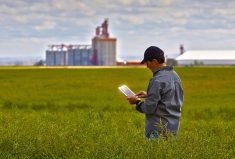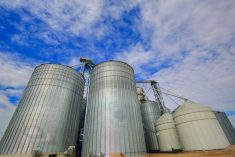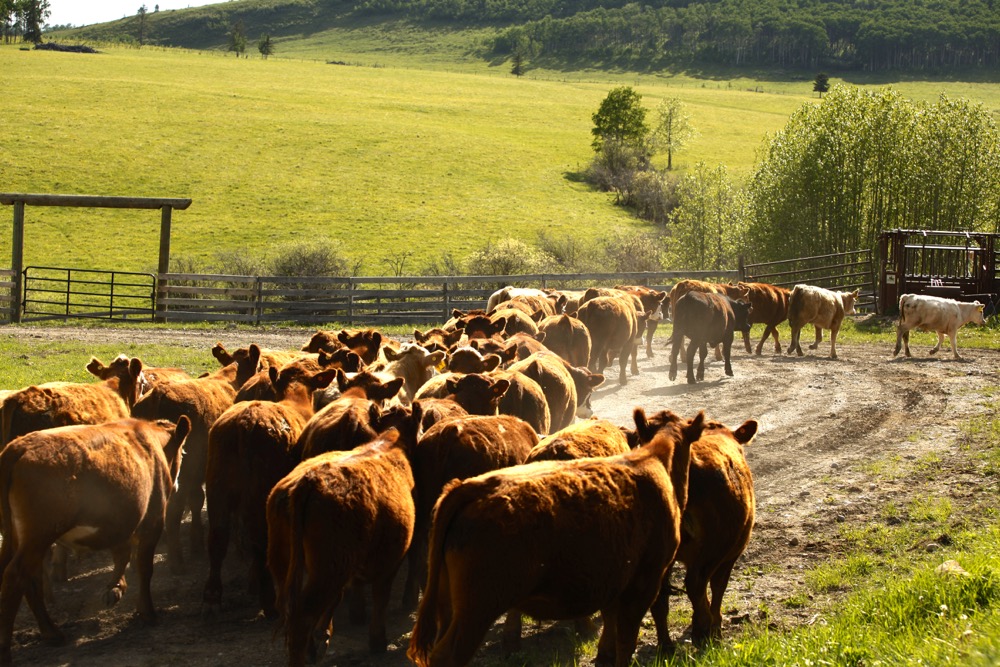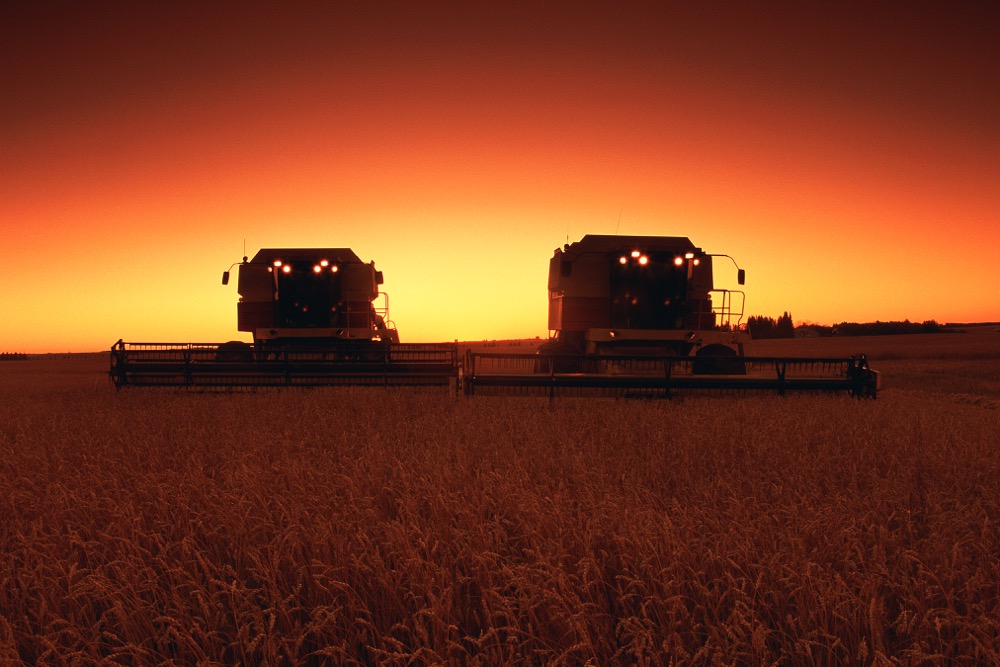Five years ago Brennan Turner and Alain Goubau were slogging it out alone. They were ahead of the curve, trying to sell western Canadian farmers on their vision of an online grain marketplace to connect grain producers and buyers, giving them the power to list, negotiate and finalize grain deals with no upfront cost.
Today, the company that Turner and Goubau founded, FarmLead, has more than 5,000 registered users. It has also sized up from the original two to 30 employees today —– and it has seen over two million tonnes of grain traded through its online platform.
Read Also

Riding the tariff rollercoaster
Farmers are accustomed to roller-coaster years. But the current geopolitical windstorm is something else entirely. On his cattle operation near…
Now FarmLead is heading for the big show. The company recently announced US$6.5 million in private investments that will support its expansion into the United States through its Chicago office, which opened this May.
Building credibility
The investors, Monsanto Growth Ventures (MGV), Avrio Capital, MaRS IAF, and Serra Ventures, have been watching the company’s progress for a while.
Or maybe for a bit longer. “They’ve been keeping track of us for a long time,” says Turner, FarmLead founder, president, and CEO. “They’ve seen that when we say something, we do it. That credibility was important for them. I think that’s important for any investment that venture capitalists or even private equity makes.”

It’s taken a lot of hard work and patience to gain that credibility, not just with investors, but with farmers and grain buyers. FarmLead handles more than 100 different crops in quantities worth anywhere from a couple of thousand dollar to $4 million, and from day one there have been no payment issues.
“Our proactive, credit risk management process ensures that grain buyers on our platform can pay for the grain, and that’s important to farmers,” says Turner.
Low cost, simple solution
From the outset, FarmLead’s objective was to provide an inexpensive and efficient way for busy farmers to list and sell their grain — and for equally busy grain buyers to source the quantities and quality of grain they need.
Signing up for the platform is free, with fees charged only on a completed transaction. Interestingly, those fees are the same for both parties — one dollar per metric tonne on the first 80 tonnes, and 25 cents per tonne thereafter.
“It usually averages out to 30 to 40 cents a tonne,” says Turner. “And it doesn’t cost anything to get to that point. In agriculture, farmers often have to pay up front to get access, or pay for something and then wait for a couple of months to see how it performs in the field. That’s not our system… it doesn’t cost farmers anything to list whatever type of grain they have to offer, and they and the grain buyers will only pay when they have made a deal.”
FarmLead isn’t a grain broker, and it’s not out to change grain buyers’ procurement practices or their existing relationships with their farmer clients. Turner sees the company’s role as a facilitator. “Farmers may not be using our platform for 100 per cent of their grain sales but they are finding a home for stuff that is harder to sell because local prices or the discount schedule are tough, or they are looking for more of a quality premium. We’ve built the tools to make that easily happen,” he says.
And they have built in corresponding benefits for grain buyers, he explains.“We are helping grain buyers when it becomes tough to fill a program, and there’s not a lot of time to do it and they have to find grain. We have a large number of motivated sellers they can engage with immediately, and close something without having to put a lot of skin in the game in terms of time, energy or money.”

Hannah Konschuh and her husband farm 5,000 acres of dryland grain crops with her parents near Bassano, Alta., and the first time she used FarmLead was to try and move some spoiled canola. “It spoiled in the bin because we combined it tough due to the late harvest and early snowfall, and my dad found a close place to sell it, but the price was terrible,” she says. “I said I’m going to post it on FarmLead and see what I can find. And what happened was, the offer to buy that I received was double the local price that we had. They also picked it up on farm. It was really great because it helped us maximize what we could get out of an unfortunate situation.
“For us,” says Konschuh, “it’s another tool that we will continue to use. We still use all of our other channels for marketing grain too, but it gives us other options.”
Informing farmers about global markets
The growth in FarmLead users has been mostly organic and comes through trade shows, active social media streams, and personal referrals by those who have used the platform.
FarmLead has also focused on providing information to farmers and empowering them to make better marketing decisions. Turner’s daily e-newsletter, the Breakfast Brief, is sent to registered FarmLead users, and appears in a number of community newspapers across Western Canada.
Being a numbers guy, with a B.A in economics from Yale University and a background in commodity trading, Turner’s aim is to help simplify the complexities of trading economics for his clients so they can better understand some of the broader global factors that affect commodity pricing.
“As an example, in one of my recent Breakfast Briefs I explained how commodity rallies build up. It’s like blowing air into the balloon. But when that balloon is full and can’t take any more, it’s the saturation point and it lets all the air out or it pops,” says Turner. The point is that as the market moves higher, farmers need to be more aware of the downside potential, “because when that happens, it’s going to happen quickly. My goal is to help farmers be better at selling their grain for more money.”
Turner can’t, of course, be on the front lines talking to every farmer and every grain buyer every day, but he’s committed to making sure his growing team has the tools and training they need to help their customers find and make the best deal.
“To do that they need to be cognizant of the pressures that that farmer might be under, for example the lack of moisture in the Dakotas, southern Saskatchewan and southern Alberta,” he says. “Making sure that when they have conversations they’re thinking of the big picture, and not just looking out the front window, but looking at what’s happening on the other side of the world and how that’s relevant to the farmer.”
Where’s the attraction?
So what has attracted major investors to FarmLead?
Kiersten Stead, investment director at MGV, said in a press release, “Very few companies are aimed at the critical commerce piece of the equation that helps farmers realize profits from day one. FarmLead built a platform that can do just that and is a key part of a diversified approach to marketing and trading grain. We are delighted to support a great team and to partner with committed investors to enable an open marketplace that gives the industry more options and a differentiated advantage.”
The fact that both Turner and Goubau come from farm backgrounds — Turner’s parents grew up on a Saskatchewan grain farm and Goubau on a dairy and cash crop farm in Eastern Ontario — is a key differentiator for the company.
The system is also simple and easy to use, another reason why it has grown fast, and attracted investment.
“Our system is incredibly easy for anyone to use, regardless of age or technology skill set” says Turner. “Here’s the price, quantity, and transportation terms, and users can negotiate using our chat feature, or a text message tool where they can text each other back and forth. Conversations can happen quickly in real time. If they have problems, they can call us and one of our customer support people will help them through how to use our system. More than anything, that simple approach to keeping farmers our priority is what helps us be successful.”
What are investors looking for?
Trying to get inside the head of potential investors isn’t easy.
There are a lot of complex factors behind investment decisions, some of which respond to immediate trends or needs, and some that are more long term in their outlook.
“Investors want to invest in technologies that move information faster, move capital goods faster, or move capital — actual money — faster,” says agricultural economist Garrett Baldwin, who joined the FarmLead team as its U.S. content marketing strategist in June 2017.
FarmLead is about the ability to bolster sales and the bottom line for farmers by meeting those three investment goals, Baldwin says. “This tool is capable of getting farmers across the board five to eight percent more on their grains. That bump will be a good underlying driver for increased sales for tractors and other farm equipment or for allocation of capital to other grains or other goods.”
Adds Baldwin, “The smart, venture capital investors are looking at one little piece of a trend and how it fits into the supply chain.” The “less smart” money, he says, is just chasing an idea or a fantasy, looking for something that will create its own marketplace by being disruptive, but not necessarily understanding the how’s or whys.
Turner agrees. “We understand the industry through and through, me on the trade side and Alain on what’s going on in the bigger picture of where the farm world is moving. That adds a lot of credibility,” he says. “You have people coming out of Silicon Valley with what, on paper, are great ideas but they don’t resonate with the farmer. And why they flop, or why they’re not necessarily doing as well as everyone thought they would, is because they don’t come from the farmer’s perspective, which I think is the most important differentiator. Our product is built for the farmer.”
The path to big
FarmLead CEO Brennan Turner admits he’s made his fair share of mistakes along the way, and has had to learn a few lessons. Here’s his advice for entrepreneurs who are thinking about taking the plunge to get bigger.
First and foremost, says Turner, don’t assume you know what your market wants.
“You need customer feedback, because if you don’t listen to the customer, then you don’t actually know if something will work.”
Also, become a better listener. Never close the door on creative ideas, whether they come from the internal team or from outside. Admittedly, this is something Turner knows he has to keep getting better at, but already it is creating a more open, dynamic company.
Turner also likes the Aristotle quote: “It is the mark of an educated mind to be able to entertain a thought without accepting it.” Developing that talent in the organization opens up wide opportunities.
“Our team has grown aggressively and we’ve got some great ideas about how and where we can help farmers and the farm economy in general,” he says. “That’s a testament to the quality of people that we’re bringing in.”
Then, Turner also recommends having conversations with other entrepreneurs who have built up successful companies of their own, not necessarily in the agricultural space.
“Getting different perspectives is incredibly valuable,” he says.
Finally, says Turner, don’t be afraid to ask for help. “Be humble about the fact that you don’t know how to do something, because there will be somebody you can talk to who can help you think through an idea or problem.”
















